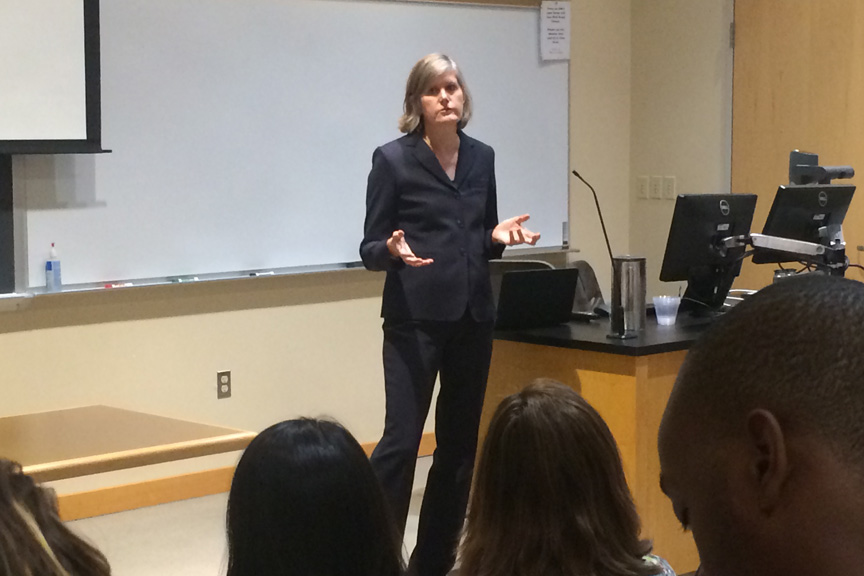Keynote speaker Sandra Steingraber speaks in Oechsle Lecture Hall
Photo by Hana Isihara ‘17
Three Lafayette professors organized a two-day symposium on hydraulic fracturing last weekend focused on an interdisciplinary approach and engagement of the entire community.
English Professor Alix Ohlin and Engineering Studies Professors Ben Cohen and Julia Nicodemus organized the event around the college’s 2014 Roethke Festival. In the spirit of that festival, they sought to provide artistic and scientific perspectives on a topic of great importance.
Hydraulic fracturing, or fracking, is a controversial method of extracting shale gas from far below the surface of the earth. Some believe it causes more environmental problems than economic benefits.
“We started talking about tracking because it was a very common topic of discussion in classes and the subject of debate, even controversy,” Cohen said.
Cohen was unsatisfied with his previous discussions of fracking on campus, which were sporadic and spoke only about one side of the issue at a time.
“It just didn’t seem very productive to us,” he said, “so we wanted to try to have some sort of forum where we could have multiple perspectives at once so you could see all the different sides.”
The speakers represented diverse backgrounds and included a geoscientist, a novelist, a sociologist, and a photographer. The keynote speaker was biologist, poet, and activist Sandra Steingraber.
While some students felt the keynote speaker expressed ideas that could apply to both sides of the fracking argument, others were less convinced.
“[Steingraber] was able to convince the whole audience of how important it is to educate ourselves about the environmental impacts that new processes such as fracking cause,” Dylan Hahn ’17 said.
“There wasn’t much two-sided discussion of the topic,” Jack Shaw ’17 said, noting that Steingraber did not remain as focused on the science as he wanted.
One of the goals of the project was to engage the local community in Easton to create bilateral communication on a mutual area of concern. This led to the location of the first panel discussion to be in the Williams Arts Campus, which is closer to Easton.
“It was less about letting the community in than letting our students see that we are part of the community,” Cohen said. “The community forum…perhaps did the best job of helping our students identify themselves as community members, because it was probably two-thirds Lafayette, one-third community.”
The symposium also invited the Nurture Nature center in Easton to contribute their expertise in fostering community-based dialogue of difficult issues.
“One outcomes of community forum was to pull together a community commentary to help build an agenda for what to next,” Cohen said.
In addition to the Roethke festival, the symposium was funded by a STEAM grant awarded from the Mellon foundation to create an event that combined the humanities and sciences.
Support for the event also came from a broad range of departments on campus, from four of the five engineering departments to economics to women’s and gender studies.
“The attendance exceeded all four events,” Cohen said. “There were far more people than we anticipated.”
While Ohlin hoped to have about 50 people attending, but estimated that about 125 came.

























































































































